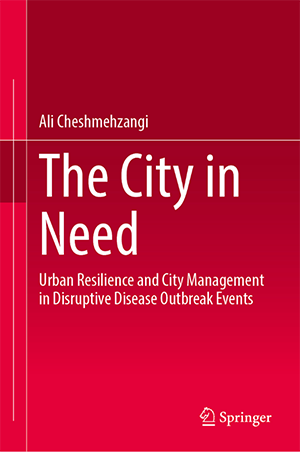Society and communities
Cities and communities after the pandemic
Professor Ali Cheshmehzangi draws on his experience and research to talk about resilient cities. His work with the Ningbo City Government demonstrates the importance of research-based policy making and the role that academics can play in the recovery from Covid-19.
Immediate changes in the community are not always obvious or big enough to impact our lives personally, but due to the pandemic, new concepts and modes of development are emerging faster than ever before. We are likely to see the push for digitisation and digitalisation in making built environments smarter and more resilient.
These days, weeks, and months will be remembered as the time the world came to a halt. This period will be marked as a health emergency and a global moment of instability. Hopefully, we will be able learn from these hard lessons and prepare more thoughtfully for the future. Undoubtedly, the Covid-19 pandemic has brought many uncertainties, health impacts, socio-economic pressures, weakening relations, and complex political situations that will leave their mark for decades to come.
Following a personal epiphany whilst travelling out of the city in late January 2020, I realised that our research could really contribute to resilience building and recovery from the pandemic. It was then that, just a few days after the city went into lockdown, my colleagues and I engaged with the local authorities of Ningbo in China. This collaboration led to the development of a comprehensive resilience framework. I developed the framework to help the city authorities to lead the protocol against the pandemic. In the midst of lockdown, the framework was integrated into local strategies, helping to support Ningbo with adequate safety and control measures. The city authorities even referred to me as a new Ningbo citizen! Since then, we have continued to work on urban resilience and the impact of Covid-19 pandemic on the city. Ningbo managed to contain the outbreak at city level in just six weeks. So far, Ningbo has only had 157 cases with no fatalities. We now trust that the city is prepared against any potential spikes.
"Given the rising number of outbreaks globally, we see the important role of effective and responsive and hopefully virtuous governance."
When facing crises, cities and communities become much more vulnerable. The impacts show how adversities are transmitted to the city. We should enhance our resilient thinking. The topic of “resilience” is more relevant to the situation than the more attractive buzz word of “smart”. Given the rising number of outbreaks globally, we see the important role of effective and responsive and hopefully virtuous governance. Hence, we require to have a holistic understanding of multiple sectors, multiple levels, multiple objectives, and multiple stakeholders.
Globally, there is no single city with an adequate healthcare capacity that can accommodate thousands of infected patients, set aside a scenario in which millions of people are infected within relatively small proximity at city level. Even the least deadly disease can spread at a gradual pace and cause a slow increase in mortality rates. This can occur mainly due to a lack of healthcare infrastructure (comprised of both capacity and provision) to accommodate larger groups of patients at the same time. With the rise of fake news discounting facts, we must realise how vulnerable we are - one disease outbreak has brought even the biggest economies to their knees! With so many deficiencies in our capabilities and capacities in global health, we must see huge standard shifts in the standards of delivery of our healthcare services and systems.
The pandemic has taught us many lessons. We witnessed many devoid of actions and compliance, we noticed growing insecurity and unfairness, there have been many attempts to recover and stabilise.
Some temporary provisions may become permanent, and some may simply cut the automation → unemployment → endless economic growth → global unsustainability knot!
The Covid-19 outbreak scrutinises many issues related to our health systems, our global economy, our people, our resilience, our management, our mistrust, our international relations, and our behaviours. It also sheds light on many negative factors, such as our acts of institutional racism, our neglect, our irresponsible behaviours, our acts of misinformation, our misjudgement, our lack of knowledge, our vulnerable societies, our weak infrastructures, our delicate cities, and our fragile relations.
Now, with the privilege of hindsight, we anticipate a time where change is not brought on so suddenly. We anticipate that cities will push for more safety and security measures in the future; some that may not be easily adaptable into other contexts or may take time to be accepted as the ‘new norm’.
Nevertheless, the impact of Covid-19 on some of the existing practices in the built environment sector cannot be neglected. From technological advancement to technology use, we will see gradual changes. These are likely to be the major drivers of technological adoption and the introduction to new shifting paradigms that are yet to be revealed. Central to all this, though will be the emphasis on the resilience of the planning and management of cities.
 The City in Need book cover
The City in Need book cover
The City in Need
In the book titled The City in Need, the topic of urban resilience in outbreak events is covered for this first time. The book, written by Professor Ali Cheshmehzangi during the first few months of the Covid-19 pandemic, helps readers gain a holistic understanding of urban resilience and city management measures in disease outbreak events, such as the Covid-19. The book also addresses key outbreak issues from ‘city preparedness’, ‘city responsiveness’, and ‘city management’ perspectives. This book, released on 9 of June 2020, is the first full monograph published on the topic of Covid-19.
Professor Ali Cheshmehzangi is Head of Department of Architecture and Built Environment and Professor of Architecture and Urban Design at the University of Nottingham Ningbo China.